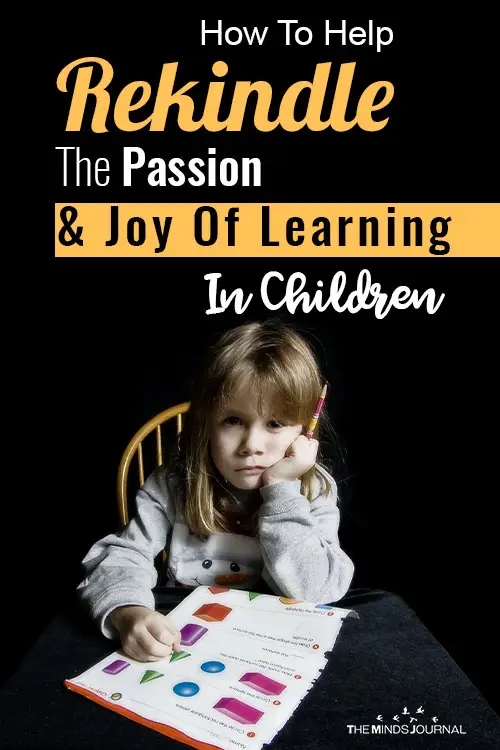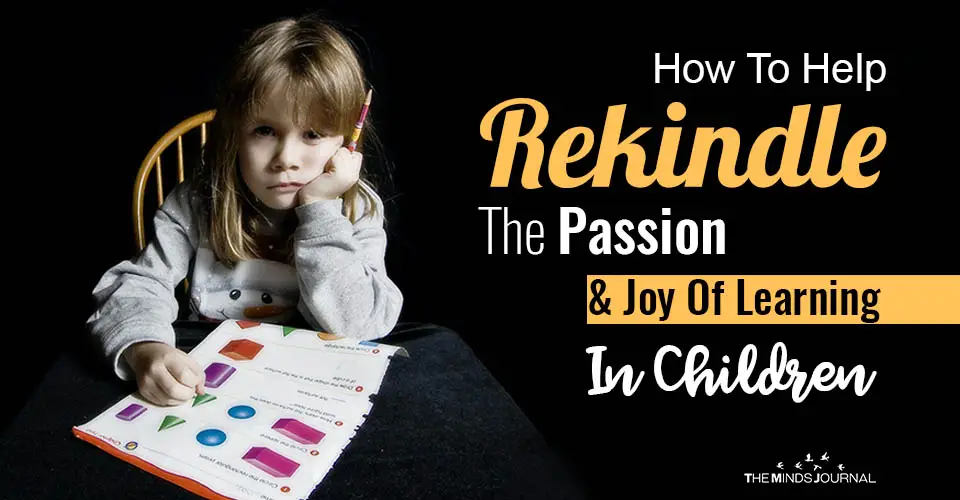As a parent, have you ever wondered about your child’s unwillingness to learn new things? Have you ever thought about why the joy of learning is gone?
Help your child regain the kindergarten passion of embracing learning with joy.
Rekindling Your Child’s Enthusiasm for School
Connect your children to what they learn at school through their interests and past positive experiences so they will WANT to learn what they HAVE to learn.
Where did the joy of learning go?
When school stops being fun, all too frequently, learning stops. Help your child retain that kindergarten enthusiasm of embracing each day with the joy of learning.
Children who appear lazy, oppositional, inattentive, scattered, unmotivated, or inseparable from their social media may not be making voluntary choices. Their brains may be responding to the stress of sustained or frequent boredom.
We know that for most children, kindergarten is anticipated with awe and enthusiasm – especially when one or older siblings are already in school. There certainly can be anxieties, but they revolve around fear of leaving a parent or the security of the home environment.
The idea of being a student is exciting. Most kindergarten or first-grade students speak passionately about what they learn and do in school. Then, as years progress, burdensome memorization, and test preparation are emphasized at the cost of diminished discovery, inquiry, and project-based learning. As school stops engaging children’s imaginations, boredom and frustration replace joy, and learning stops.
Students currently in public high schools in the U.S. are more likely to drop out than ever before. When the reasons for dropping out are examined, almost 80 percent of the students report that the main reason is boredom. When asked what bores them, the most frequent responses are that the material they are taught is either uninteresting or has no relevance to their lives.
Want to know more about bringing back the joy of learning? Read Kids Activities at Home: Ways To Keep Kids Busy Without Much Screen Time
The Stress of Boredom Blocks Brain Traffic Flow
Neuroimaging and other research tools continue to yield more data about the brain’s response to stress including sustained or frequent boredom. This comes at a time when boredom is increasingly problematic; as school funding and teacher performance ratings are increasingly tied to test performance. Consequently, there is more time dedicated to repetition, drill, and testing of facts that have no clear personal relevance or value to children.
Cutting edge neuroimaging research reveals significant disturbances in the brain’s information processing circuits in stressful learning environments. Information communication is blocked in these stress states and new learning cannot pass into memory storage. The “thinking, reflective” upper brain cannot downward regulate to direct behaviors, which then become involuntary.
Here’s what happens. The amygdalae are switching stations deep in the brain’s emotional limbic system that are stress-reactive. In the stress state, such as with prolonged or frequent boredom, the metabolic activity of these emotional filters increases. When this happens, the ability of the amygdalae to direct input to or from the thinking and reflecting brain, the prefrontal cortex (PFC) is limited.
In the normal state, without high stress, the amygdalae allow input from the senses (what we hear, see, feel, experience) to reach the PFC where it can become long-term memory. The PFC is also the control center that, in the nonstress state, sends communications down to the rest of the brain to consciously and thoughtfully direct our responses, choices, and behaviors.
During high stress, the amygdalae block communication with the PFC and send input to the lower, reactive brain, where memory is not constructed and behavioral responses are no longer involuntary control. This is the involuntary fight-flight-freeze response to stress or fear in all mammals – in humans: the act out, zone out, drop out behavior reactions.
Brains Keep Track of Effort That Doesn’t Pay Off
For many children, the stress response to boredom and low personal relevance builds year after year when they do not find learning interesting or relevant. When children’s brains develop negativity to school, the stress state limits their voluntary control to sustain attention in class, do homework carefully, and persevere at challenging classwork.
Their brains learn to automatically resist putting mental effort into activities they have experienced as boring or irrelevant.
This is often the situation when children who are quite intelligent have difficulty with rote memorization. Since memorization is often what is tested it is inaccurately perceived by children as a measure of their intelligence. They develop the belief that their failure to get high grades on rote memory tests means they don’t have the ability to succeed. That mindset is not only inaccurate but when taken on by your child, it means their brains go into the fixed mindset of avoiding challenges and loss of motivation to persevere through setbacks.
Make Learning Personally Relevant
You can help your children keep their brains out of the involuntary, inefficient stress state. Keep them engaged and motivated to put effort into learning at school by connecting their classroom studies to their interests. Connecting them through personal relevance to the topics they study results in less boredom, and the opening of the neural pathways through their amygdalae to their upper, intelligent brains where true learning and creative thinking take place.
You can use strategies so they will WANT to learn what they HAVE to learn. Connect their brains to the topics they will be studying at school by looking with them at photos or videos of family trips, connecting objects they own to the countries they study, reading stories that relate to topics in science, history, and math.
The curiosity prompted by your reminders of their past experiences and current interests becomes a brain bridge ready to link with the information they must learn for school. The Velcro to stick new information is waiting in their brains for their neural circuits to engage learning through positive connections.
Questions as Curiosity Boosters
You’ll further preheat their interest in schoolwork when you ask your children questions that help them personally connect to the current or upcoming school topics. Their brains remain attentive because they are personally interested, and therefore curious, about the answer to the question. Discussions you promote to bridge your children to their schoolwork will also serve as stronger memory cement if you are an active, attentive listener when they express their opinions about your questions as they learn more about the topic in school. This is not the time to split your focus. To keep them motivated, your children need to know you are truly interested in their ideas and opinions.
The results will more than offset your planning and preparations. Smiles will replace groans and eye-rolls as you use neuroscience to return to your child the joys of learning.
Looking to know more about how you can inculcate the joy of learning in your children? Read Raising Creative Kids: What Parents Need To Know
Negativity Turns to Motivation!
Your interventions will help your children avoid the learning turn off to the challenges of today’s fact-heavy curriculum and limited opportunities for curiosity and discovery. You will help them construct the brain circuits to become lifelong learners who can transfer and apply what they learn to real-world situations.
They’ll respond to learning more efficiently and store what they learn in their long-term and memory. They will secure learning available not only to retrieve for the test but also to face the unique challenges and opportunities awaiting them in the 21st century.
Written By Judy Willis
Originally Appeared In Psychology Today
Boredom is one of the biggest reasons for the lack of creativity in children and as a parent, the best thing you can do to counter that is to bring back curiosity in them. Inculcating a sense of curiosity can help your kid get in touch with their creative side, and also look forward to learning again.









Leave a Reply
You must be logged in to post a comment.